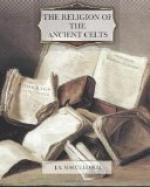Some writers have maintained that Elysium is simply the land of the dead, although nothing in the existing tales justifies this interpretation. M. D’Arbois argues for this view, resting his theory mainly on a passage in the story of Connla, interpreted by him in a way which does not give its real meaning.[1263] The words are spoken by the goddess to Connla, and their sense is—“The Ever-Living Ones invite thee. Thou art a champion to Tethra’s people. They see thee every day in the assemblies of thy fatherland, among thy familiar loved ones."[1264] M. D’Arbois assumes that Tethra, a Fomorian, is lord of Elysium, and that after his defeat by the Tuatha Dea, he, like Kronos, took refuge there, and now reigns as lord of the dead. By translating ar-dot-chiat ("they see thee,” 3rd plur., pres. ind.) as “on t’y verra,” he maintains that Connla, by going to Elysium, will be seen among the gatherings of his dead kinsfolk. But the words, “Thou art a champion to Tethra’s people,” cannot be made to mean that Tethra is a god of the dead. It means simply that Connla is a mighty warrior, one of those whom Tethra, a war-god, would have approved. The phrase, “Tethra’s mighty men,” used elsewhere,[1265] is a conventional one for warriors. The rest of the goddess’s words imply that the Immortals from afar, or perhaps “Tethra’s mighty men,” i.e. warriors in this world, see Connla in the assemblies of his fatherland in Erin, among his familiar friends. Dread death awaits them, she has just said, but the Immortals desire Connla to escape that by coming to Elysium. Her words do not imply that he will meet his dead ancestors there, nor is she in any sense a goddess of death. If the dead went to Elysium, there would be little need for inviting a living person to go there. Had Connla’s dead ancestors or Tethra’s people (warriors) been in Elysium, this would contradict the picture drawn by the goddess of the land whither she desires him to go—a land of women, not of men. Moreover, the rulers of Elysium are always members of the Tuatha De Danann or the sid-folk, never a Fomorian like Tethra.[1266]




